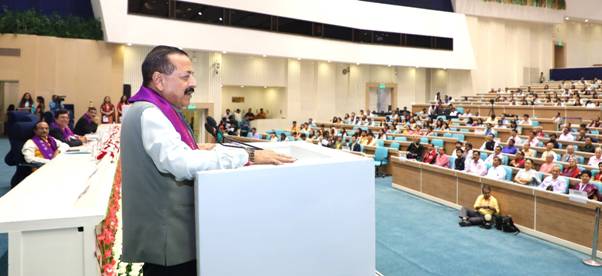Union Minister Dr. Jitendra Singh on Saturday said that India’s medical education and healthcare sectors have undergone a transformative shift over the past decade, making healthcare more accessible, affordable, and inclusive.
Speaking at the 54th Foundation Day and Convocation of the University College of Medical Sciences (UCMS), University of Delhi, Dr. Singh conferred degrees on undergraduate and postgraduate students and urged the new generation of doctors to blend compassion with innovation.
Highlighting the expansion of medical education, he said the number of undergraduate medical seats in India had increased from around 45,000 a decade ago to nearly 1.5 lakh today. He noted that the expansion of institutions like AIIMS has democratized medical education and enabled more women to pursue medical careers.
Dr. Singh said India’s healthcare delivery has transformed along three key principles — accessibility, affordability, and availability — crediting flagship initiatives like Ayushman Bharat and Jan Aushadhi Kendras for redefining the state’s relationship with citizens in health services. He also lauded the inclusion of pre-existing diseases under health insurance, calling it “one of the most humane innovations” in public health policy.
Underscoring India’s growing global standing in biotechnology and life sciences, the Minister said the Department of Biotechnology developed the world’s first DNA vaccine for COVID-19 and an indigenous HPV vaccine for cervical cancer prevention. He added that India now supplies vaccines to over 200 countries.
Dr. Singh cited other breakthroughs, including India’s first indigenous antibiotic, Nafithromycin, and successful gene therapy trials for haemophilia published in the *New England Journal of Medicine*, as examples of India’s leadership in preventive and therapeutic healthcare. He called on academic institutions like UCMS to collaborate more closely with private players and research organizations. “The age of working in silos is over,” he said, stressing the importance of partnerships between academia, industry, and government laboratories.
A souvenir chronicling UCMS’s 54-year journey was released on the occasion, highlighting the institution’s contributions to medical research, education, and community healthcare through its association with GTB Hospital. Dr. Singh also presented awards and medals to outstanding students and faculty members for their academic and research achievements.
Reflecting on India’s evolving health challenges, the Minister said doctors today must tackle a “bi-phasic disease spectrum” — managing both communicable and non-communicable diseases — amid an ageing population and rapid technological advancement.
He emphasized the growing role of artificial intelligence in transforming medical practice, particularly in diagnostics and patient care. “AI can communicate in a patient’s language and offer comfort through human-like interaction,” he said, describing it as a “hybrid model that combines empathy with innovation.”
Dr. Singh urged the young graduates to embrace their role in shaping India’s healthcare future. “Those receiving their degrees today will be at the peak of their careers when India marks 100 years of independence in 2047,” he said. “Destiny has given you the opportunity to be the architects of a healthier, more self-reliant India.”














